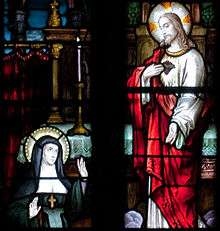Gift of miracles
In Christian theology, the gift of miracles is among the spiritual gifts (charismata) mentioned by St. Paul in his First Epistle to the Corinthians. As a charism, the gift is imparted to individuals by the power of the Holy Spirit.[1] The view of Cessationism held that the charismata were exclusively for Apostolic times, and therefore the gift of miracles ceased with the writing of the last book of the Bible or the death of St. John the Apostle. In Continuationism, on the other hand, the gifts are held to be possible throughout the history of Christianity, and to have occurred since Apostolic times.
Catholicism
In Catholicism, the gift is one of the extraordinary graces of the Holy Spirit imparted to certain individuals so that Christ's doctrine may become credible and Christians confirmed in their faith. Although miracles are necessarily the work of God, men and angels may be said to work miracles in a threefold way
- by their prayers invoking a miraculous effect;
- by disposing or accommodating the materials, as it is said of the angels that they will in the resurrection collect the dust of the dead bodies that these may be re-animated by the Divine power,
- by performing some other act in co-operation with the Divine agency, as in the case of the application of relics, or of visits to holy places which God has marked out for special and extraordinary favours of this kind.
Like other charismata, these are special and extraordinary powers vouchsafed by God only to a few, and primarily for the spiritual good of others rather than of the recipient.[1]
Pentecostals and charismatics
In Pentecostal and charismatic Christianity, it is believed that God continues to operate this gift through believers with the gift of faith.[2] This gift does not, however, make one a miracle worker since it is God who performs the miracle. The emphasis is on "the power of God operating by the Spirit of God in and through the Church of God".[3] God always signifies or teaches something with miraculous manifestations.[2]
See also
References
- 1 2 Devine, Arthur (1911). "Gift of Miracles". The Catholic Encyclopedia. 10. Robert Appleton Company. Retrieved 18 June 2011.
- 1 2 Guy P. Duffield and Nathaniel M. Van Cleave, Foundations of Pentecostal Theology, 1983, (Los Angeles: Foursquare Media, 2008), p. 338.
- ↑ Gee, Donald. Concerning Spiritual Gifts. Springfield, Missouri: Gospel Publishing House. ISBN 0-88243-486-1. Page 54.
Further reading
- Grudem, Wayne A. (editor). Are Miraculous Gifts for Today? Zondervan, 1996. ISBN 978-0-310-20155-7. Four authors each provide four viewpoints concerning spiritual gifts: Cessationist, "Open But Cautious", Third Wave, and Pentecostal/Charismatic.
- Deere, Jack. Surprised by the Power of the Spirit. Grand Rapids: Zondervan, 1993. ISBN 978-0-310-21127-3.
- Lim, David. "Spiritual Gifts" in Systematic Theology, A Pentecostal Perspective revised edition, edited by Stanley M. Horton. Springfield, MO: Logion Press, 1994. ISBN 0-88243-855-7.
- Wagner, C. Peter. Discover Your Spiritual Gifts: The Easy-To-Use, Self-Guided Questionnaire That Helps You Identify and Understand Your Various God-Given Spiritual Gifts, expanded edition. Regal, 2010. ISBN 978-0-8307-3678-2.
- Wimber, John and Springer, Kevin. Power Evangelism, revised and enlarged edition. Regal, 2009 (originally 1986). ISBN 978-0-8307-4796-2.
